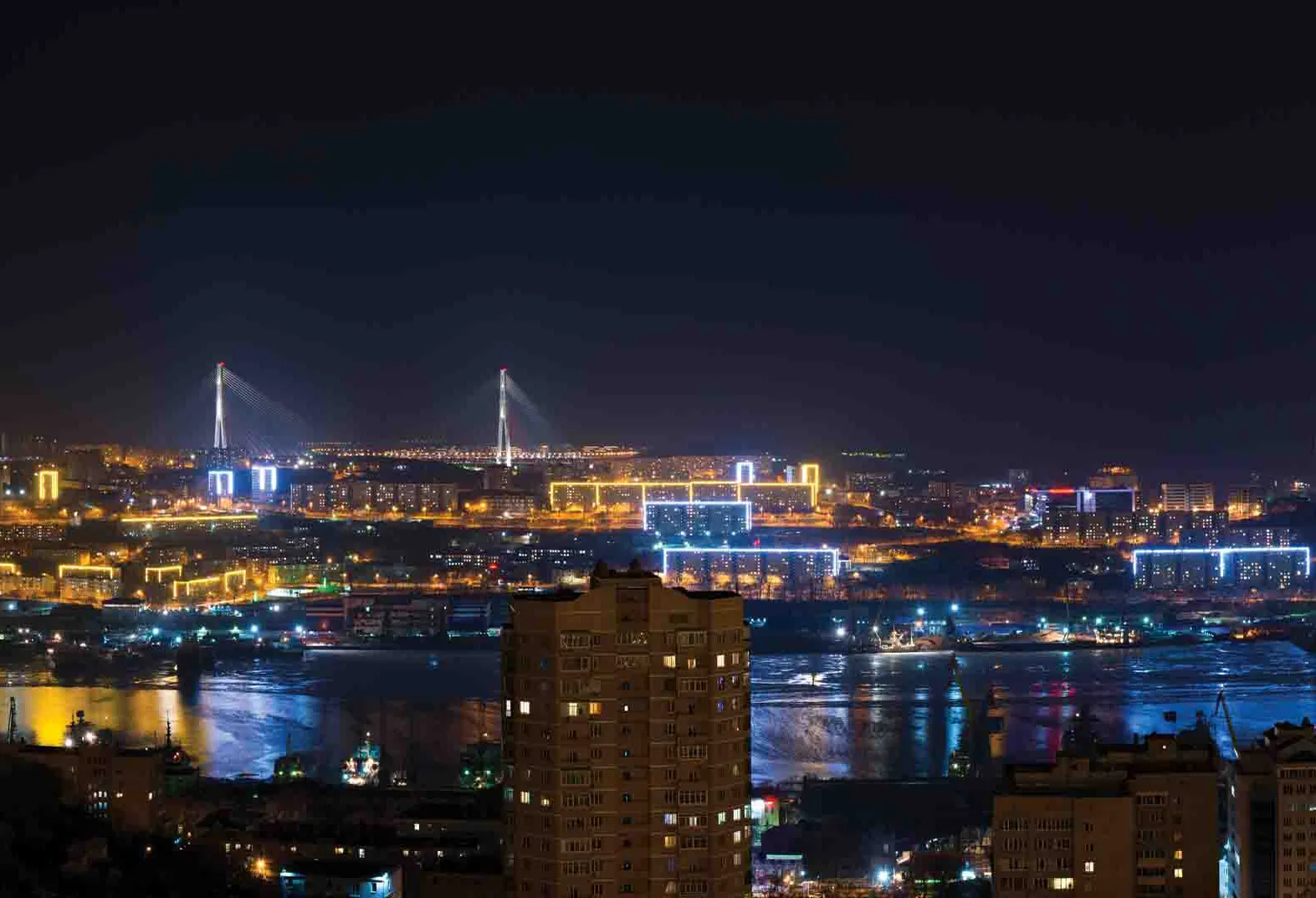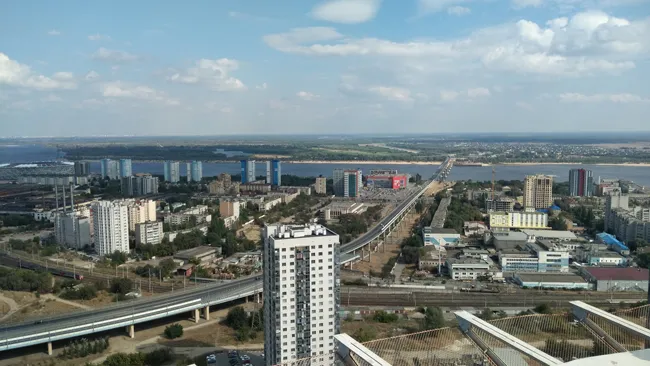Khabarovsk Bypass to raise transit potential of Russian Far East – Eugene Gerden writes
The Russian Government, together with the government of Khabarovsk Territory, an administrative capital of the Far East, have announced the completion of preparations for the building of a new road. The Khabarovsk Territory is located 30km from the Chinese border, at the confluence of the Amur and Ussuri Rivers. This new highway will boost the transport potential for the Russian Far East and will improve the traffic s
March 13, 2017
Read time: 4 mins

Khabarovsk Bypass to raise transit potential of Russian Far East – Eugene Gerden writes
The Russian Government, together with the government of Khabarovsk Territory, an administrative capital of the Far East, have announced the completion of preparations for the building of a new road. The Khabarovsk Territory is located 30km from the Chinese border, at the confluence of the Amur and Ussuri Rivers. This new highway will boost the transport potential for the Russian Far East and will improve the traffic situation in the region.
The new road is known as the Khabarovsk Bypass and will connect three existing federal highways in Russia with each other: the A-370 Ussuri; the P-297 Amur; as well as the A-375. According to Vyacheslav Shport, the governor of the Khabarovsk region, building of the new road will be the first transport project in the region, which will be implemented on the basis of public-private partnership.
Under the terms of the project, the length of the new road, which will have four lanes in all, with two in each direction, will be about 27km. It will be 15m wide, and will be designed for the maximum permissible speed of 120km/h. The new road will have traffic capacity of 96,000 cars/day.
The route will pass through five road junctions, 24 bridges and overpasses. It will have five charging points of the stop-and-go type. The project will be implemented by LLC Regional Concession Company, a local firm, which was recently named as the winner of the tender and signed a 15-year concession agreement to build the road with the government of the Khabarovsk Territory on December 12th 2016.
The value of the contract is estimated at around US$900 million (RUB 50 billion). There were 40 bidders for the contract, many of which were from outside Russia.
Construction work is scheduled to commence in the 2nd quarter of 2017 and the new road is expected to be officially commissioned at the beginning of 2020. The proposal to build the new road was first put forward in 2010 after the official launch of the Amur highway, a federal road that forms part of the Trans-Siberian Highway.
With a length of 2,100km this is the longest segment, from Chita to Khabarovsk, connecting the paved roads of Siberia with those of the Russian Far East. The construction of Amur united the Russian federal highways into a single system, stretching from Saint Petersburg to Vladivostok. Building the Amur road meant that Khabarovsk became a link connecting Russia’s two federal highways, and in particular Chita - Khabarovsk and Khabarovsk - Vladivostok. This has resulted in the influx of transit vehicles and cargo flows into the city, which significantly complicated the transport situation within its territory, which doubled the congestion on the local road network.
According to Vladimir Bychenko, chief adviser of the governor of Khabarovsk Territory, about $360 million (RUB 20 billion) will be allocated from the federal budget, another $198 million (RUB 11 billion) - from the regional, while the remainder will be provided by the investor.
Part of the funds for the implementation of the project will be allocated from the investment fund, which is accumulated by the Platon system, a new truck tax system, introduced in Russia in November 2015. The new system was intended to compensate for the damage done to roads by heavy vehicles and requires drivers of trucks weighing over 12tonnes to pay $0.02/km (1.53 rubles/km) when they travel on federal roads.
The toll road will cost $1.98/car (112 rubles) and the new road will allow drivers to save an hour of journey time. According to Nicholas Brusnikin, deputy chairman of the government of the Khabarovsk Krai, building the new road will bring huge benefits not only for the Khabarovsk city, but for the entire Far East region.
Brusnikin has also said that the new road will increase the transit potential of the Far East and will synchronise the ever growing congestion on Russia’s Far East ports and railways. In addition, it will create conditions for the development of intermodal transportation in the region by air, rail and road transport.
And according to Bychenkov, building the new road is justified by the fact that the current volume of transport from the European part of Russia to the marine terminals of Vladivostok exceeds the current transport capacities of road transport by 32%. By 2030, cargo traffic in this direction will increase by a factor of 1.5, compared to the current figures.
The technical and feasibility study of the project was completed by Stroiproeckt, one of Russia's leading design firms.
The Russian Government, together with the government of Khabarovsk Territory, an administrative capital of the Far East, have announced the completion of preparations for the building of a new road. The Khabarovsk Territory is located 30km from the Chinese border, at the confluence of the Amur and Ussuri Rivers. This new highway will boost the transport potential for the Russian Far East and will improve the traffic situation in the region.
The new road is known as the Khabarovsk Bypass and will connect three existing federal highways in Russia with each other: the A-370 Ussuri; the P-297 Amur; as well as the A-375. According to Vyacheslav Shport, the governor of the Khabarovsk region, building of the new road will be the first transport project in the region, which will be implemented on the basis of public-private partnership.
Under the terms of the project, the length of the new road, which will have four lanes in all, with two in each direction, will be about 27km. It will be 15m wide, and will be designed for the maximum permissible speed of 120km/h. The new road will have traffic capacity of 96,000 cars/day.
The route will pass through five road junctions, 24 bridges and overpasses. It will have five charging points of the stop-and-go type. The project will be implemented by LLC Regional Concession Company, a local firm, which was recently named as the winner of the tender and signed a 15-year concession agreement to build the road with the government of the Khabarovsk Territory on December 12th 2016.
The value of the contract is estimated at around US$900 million (RUB 50 billion). There were 40 bidders for the contract, many of which were from outside Russia.
Construction work is scheduled to commence in the 2nd quarter of 2017 and the new road is expected to be officially commissioned at the beginning of 2020. The proposal to build the new road was first put forward in 2010 after the official launch of the Amur highway, a federal road that forms part of the Trans-Siberian Highway.
With a length of 2,100km this is the longest segment, from Chita to Khabarovsk, connecting the paved roads of Siberia with those of the Russian Far East. The construction of Amur united the Russian federal highways into a single system, stretching from Saint Petersburg to Vladivostok. Building the Amur road meant that Khabarovsk became a link connecting Russia’s two federal highways, and in particular Chita - Khabarovsk and Khabarovsk - Vladivostok. This has resulted in the influx of transit vehicles and cargo flows into the city, which significantly complicated the transport situation within its territory, which doubled the congestion on the local road network.
According to Vladimir Bychenko, chief adviser of the governor of Khabarovsk Territory, about $360 million (RUB 20 billion) will be allocated from the federal budget, another $198 million (RUB 11 billion) - from the regional, while the remainder will be provided by the investor.
Part of the funds for the implementation of the project will be allocated from the investment fund, which is accumulated by the Platon system, a new truck tax system, introduced in Russia in November 2015. The new system was intended to compensate for the damage done to roads by heavy vehicles and requires drivers of trucks weighing over 12tonnes to pay $0.02/km (1.53 rubles/km) when they travel on federal roads.
The toll road will cost $1.98/car (112 rubles) and the new road will allow drivers to save an hour of journey time. According to Nicholas Brusnikin, deputy chairman of the government of the Khabarovsk Krai, building the new road will bring huge benefits not only for the Khabarovsk city, but for the entire Far East region.
Brusnikin has also said that the new road will increase the transit potential of the Far East and will synchronise the ever growing congestion on Russia’s Far East ports and railways. In addition, it will create conditions for the development of intermodal transportation in the region by air, rail and road transport.
And according to Bychenkov, building the new road is justified by the fact that the current volume of transport from the European part of Russia to the marine terminals of Vladivostok exceeds the current transport capacities of road transport by 32%. By 2030, cargo traffic in this direction will increase by a factor of 1.5, compared to the current figures.
The technical and feasibility study of the project was completed by Stroiproeckt, one of Russia's leading design firms.








